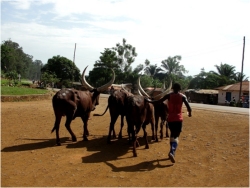 |
Contact usUnited Caribbean
Moringa
Drop of Hope School ProjectEcological ReforestationMoringa Agro Glamping |
home>> moringa
miracle tree>>moringa animal fodder
Moringa the Miracle Tree - animal fodder Goats & Sheep
It could be recommended that Moringa can help small and medium-scale farmers overcome shortages of good quality feeds and therefore sustain and improve their livestock productivity, and the Agroforestry can be adopted as strategic nutrition supplementation as many tree leaves, flowers and pods are identified as useful for improving milk production, milk fat, body condition and for the induction of estrus. In situations, where the available grazing is not generally sufficient to meet the maintenance requirements of animals, at least for part of the year, trees can alleviate the feed shortages or even fill up the feed gaps especially in the summer period when grassland growth is limited or dormant, due to unfavorable weather conditions. |
|
Cattle
The high protein content of Moringa leaves must be balanced with other energy food. Cattle feed consisting of 50% Moringa leaves should be mixed with molasses, sugar cane, sweet (young) sorghum plants, or whatever else is locally available. Care must be taken to avoid excessive protein intake. Cattle were fed 15-17 kg of Moringa daily. Milking should be done at least three hours after feeding to avoid the grassy taste of Moringa in the milk. With Moringa feed, milk production was 10 liters/day. With moringa feed, daily weight gain of beef cattle
was 1,200 grams/day. The higher birth weight (3-5 kg) can be problematic for small cattle. It may be advisable to induce birth 10 days prematurely to avoid problems. Incidence of twin births also increased dramatically with moringa feed: 3 per 20 births as opposed to the usual average of 1:1000. Information sourced from www.nairaland.com In addition Mulberry trees that can be grown under varied climatic condition, including fallow and wastelands not fit for agriculture can be used, totally or partly, for producing nutritious green fodder. Feeding mulberry as part of the daily ration of cows, improved the quality and quantity of milk and reduced calving intervals. Rabbits
Sourced: dspace.knust.edu.gh: Mulberry fodder in rabbit production: The high levels of nurtriants intake and digestibility confirm the high nutritive value of mulberry eaves and their potential as a forage that can support rabbit production. With comparable DM intake, digestibility and weight gain as in all-concentrate ration achieved with up to 50% substitution of concentrate in rations, rapid growth rate of rabbits can be achieved at less cost. Where marketing opportunities does not necessitate rapid weight gains, producers may chose to substitute more concentrate or even feed mulberry leaves as a sole diet to achieve satisfactory gains at even lower costs. Chickens
Hence, there is a need to search for locally available alternative sources of protein for use as feed supplement to poultry. Feed costs amount to a considerable proportion of production cost in any intensive livestock production system . It has been reported that, feed cost represents up to 60-80% of the total cost of broiler production. Fishmeal, a conventional feed resource, has been used as the source of animal protein in diets of poultry in many countries due to unavailability of cheaper alternative protein sources. With the present trend of rising prices of feedstuffs, considerable attention has been placed on the search for non-conventional feedstuffs. Various leaf meals have been used in poultry diets, including not only Mringa but those of Leucaena and Mulberry. In laying hens, the recommended inclusion rate for leucaena leaf meal is 10 % Mulberry is another excellent feedstuff plant due to its good adaptability, long cultivation history, mature planting techniques, high leaf yield, abundant nutrition, and a great deal of active substances of health care. Mulberry leaf powder supplementation at 10% would cut down the cost of poultry feed. In addition the protein from Moringa leaves may be fed to poultry in the form of leaf protein concentrate. Moringa leaf meals do not only serve as protein source but also provide some necessary vitamins, minerals and oxycaretenoids which cause yellow colour of broiler skin, shank and egg yolk. Feeding chickens with Moringa leaves and seeds will improve egg production. The inclusion of Moringa oleifera leaves meal up to 30% in the diet of growing traditional Senegal chickens had no negative impact on live body weight,average daily weight gain, feed conversion ratio, carcass and organs characteristics, health and mortality rate in birds compared to their controls. Considering these results and the high price of raw ordinary ingredients, particularly protein ingredient sources in poultry feeding; the recovering of these leguminous leaves in the diets of chickens is a real opportunity for traditional stockholders to improve at lower cost, not only the productivity and nutritional status of their birds but also their income with a 50% saving. Pigs
SOWING SEEDS OF SUCCESS - MORINGA CURRICULUM SUPER FRUIT CURRICULUM NEW LIFE CURRICULUM
|
| Copyright © 2024 www.UnitedCaribbean.com. All rights reserved. Disclaimer Click to Contact us |

























































